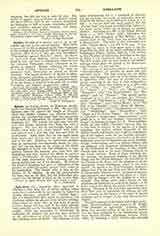

Apelles, founder of a Gnostic sect; d. at an advanced age late in the second century. What little is known of his life is gleaned chiefly from fragments of the writings of his antagonist Rhodon, preserved by Eusebius (Hist. Eccl., V, xii), and from Tertullian‘s “Prescription against Heretics” (xxx). At Rome he separated from Marcion, whose most famous pupil he was, and went to Alexandria, where he met the visionary Philumene, whose utterances he regarded as inspired. Besides collecting her oracles in a book entitled “Manifestations”, he wrote an extensive work, Eullogismoi an attack on Mosaic theology. The moral character of Apelles is differently estimated according as one is influenced either by Rhodon’s uncolored picture of the aged heresiarch, or by the stories of scandals in his early life to which Tertullian, not without exaggeration, refers.
JOHN B. PETERSON

